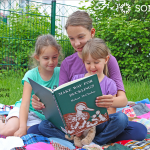
Is your child’s attention span longer than a goldfish? Are you deliberately raising kids who can focus deeply?
According to a recent study, a goldfish has an attention span of nine seconds, while most people lose concentration after only eight.
In the early 2000s (the dawn of the smartphone), that number was higher at 12 seconds. Researchers think this may indicate that our constant use of digital technology is actually reshaping our brains and shrinking our attention.
So what’s the most important thing we can teach our kids in this age of social media, texting and instant information?
Kids Who Can Focus are Successful Kids
I think the skill that will incline people to greater success in this generation is the ability to focus.
They need to learn other things as well, of course. But consider this—the blockage in education used to be access to information. For example, if you lived in England in the year 1500, you'd be lucky to know how to read, let alone own a single book or live near a library.
But today your children probably have more information at their fingertips than they could ever use. They have books and the internet at their disposal. A quick Google search can yield information about nearly anything. But many children today are unable to effectively use this information because they are not learning how to concentrate.
I know some high school students who think they can do good scholarly work while texting constantly with friends and checking Facebook every two minutes. In fact, the average young adult in America checks his smart phone 74 times a day. I don't believe that serves them well. Rather, I believe we must help our kids learn how to purposely avoid constant interruptions, to stand against the barrage of information … and actually focus on the task at hand.
The Power of Executive Control
I read a fascinating article about this in The Wall Street Journal titled Learning How to Focus on Focus. The subtitle says it all: "In an age of information overload, simply paying attention is the hardest thing." I wish I could let you read it all, but the full article, apparently, is available only to subscribers.
The author, Jonah Lehrer, refers to "executive function," which he defines as "a collection of cognitive skills that allow us to exert control over our thoughts and impulses." He cites studies that suggest that people who learned to regulate their impulses as children (e.g., sitting and focusing on homework instead of running over to watch TV), were far less likely to reach extremes such as becoming criminals or being addicted to drugs later in life. In fact, Lehrer says, "In many instances, the ability to utilize executive control was more predictive of adult outcomes than either IQ scores or socioeconomic status."
That's good news to me. Why? Because regardless of children's natural IQ or socioeconomic position, we can definitely help them increase their ability to concentrate. Parents can help children do this through activities that require them to focus. (And by turning off the TV, cell phone and computer while they concentrate.)
I love this quote from the article:
Given the age in which we live, it makes no sense to obsess over the memorization of facts that can be looked up on a smartphone. It's not enough to drill kids in arithmetic and hope that they develop delayed gratification by accident. We need to teach the skills of executive function directly and creatively.
The article suggests that activities like art, physical exercise, tae-kwon-do, and difficult board games can all help children increase their ability to focus. I've seen 7-year-olds fall in love with chess and play games that last for hours. And let me tell you, when children become that engrossed in thinking, good things happen in their brains.
In our family, Justin played chess for hours as a very young child, Jonelle loved working jigsaw puzzles, Luke filmed movies, and Amy read. They still continue these hobbies to this day!
Raise Kids Who Can Focus by Limiting Distractions
I'd also like to encourage you to limit the number of distractions your children regularly encounter.
It is perfectly reasonable to ask your children to sit down and work without access to electronic distractions. That skill alone will help your children their entire lives.
One of the benefits of a literature-based education is that the very process of learning together through real books is shaping your children’s brains for the better each day and giving your whole family a deep dive into the world of ideas—a respite from swimming in the shallows of social media and the constant stimulation of the digital world.
When we limit access to devices and build positive relational time around good books, we are cultivating a love for something truly good for our students. We aren’t just removing screens, but filling their minds and hearts with the good stuff that will serve as a springboard not only for imagination, creativity and critical thinking, but also the rare discipline of full attention.
So what do you think? Do parents today have to work harder to help their children learn delayed gratification and focus? What has helped your own children learn to block out distractions and concentrate?







